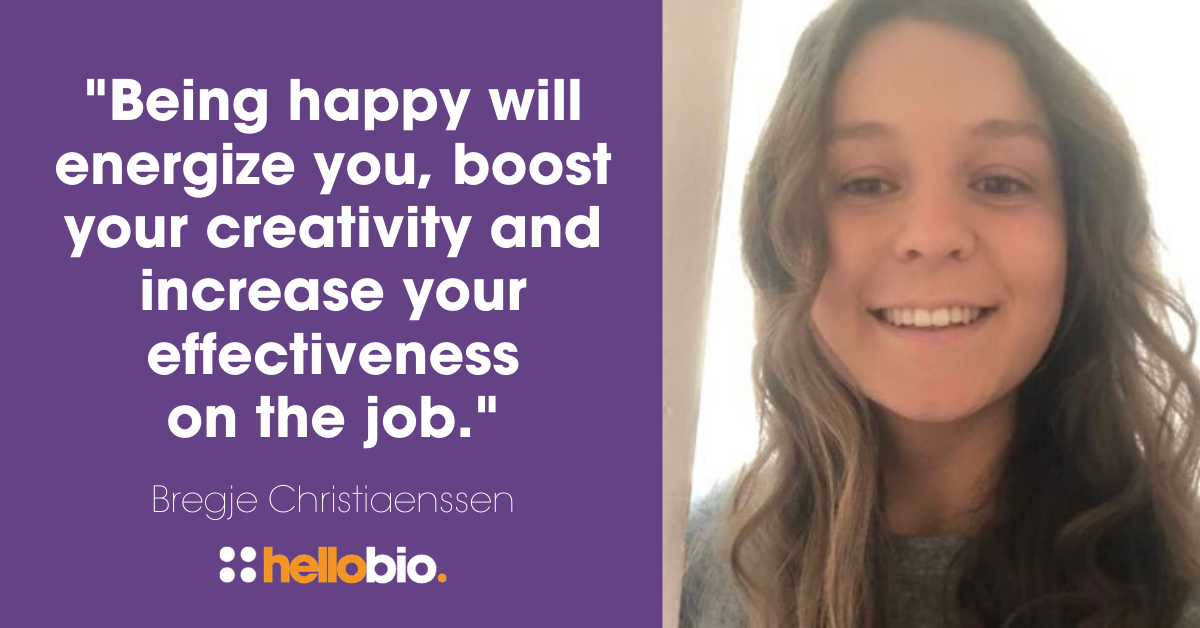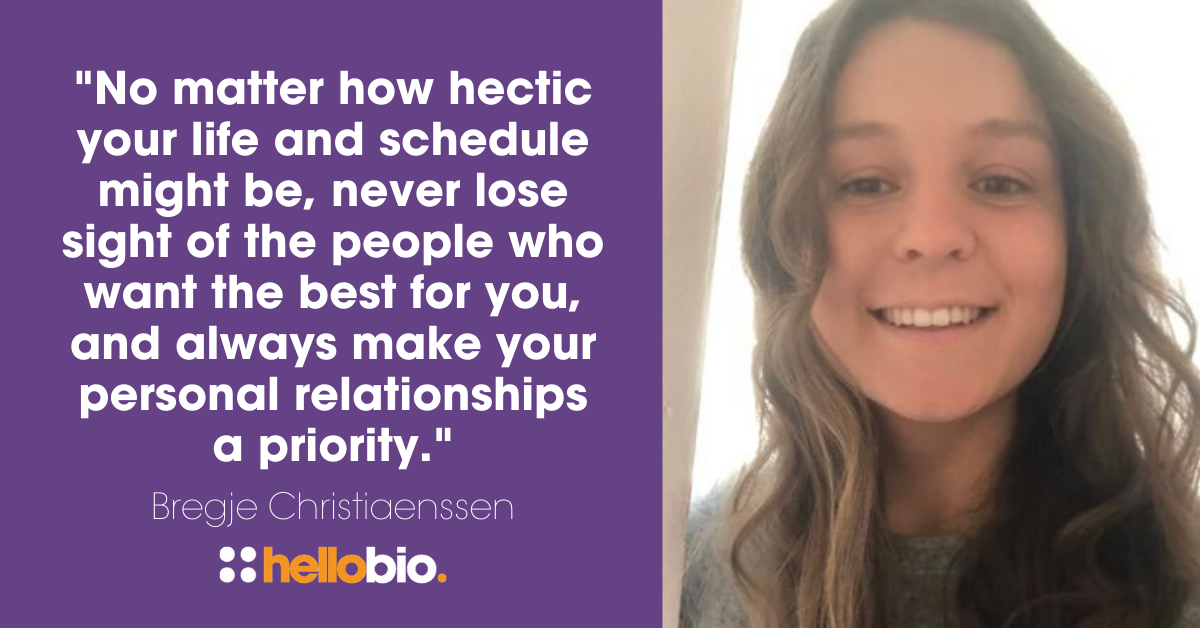Work Hard, Play Hard: Finding A Healthy Balance as a Scientist
Maintaining a good work-life balance isn’t as easy as many people think, especially in an age where technology has made workers accessible 24 hours a day. This is certainly the case in my field, as a greater proportion of molecular biology is now dominated by computational approaches that can be done anywhere and at any time. This in turn means that having a healthy work-life balance is even more important to avoid 'burning’ or even ‘boring’ out. There are many excellent articles that have been written on this and related topics, but the truth is that this mystical goal of a good work-life balance means something different to each individual person, depending on for example, their personality, interests, fears, and daily work rhythms.
Which activities bring you inner peace? When are you at your happiest? When do you perform the best? Do you prefer to be alone sometimes? How well can you handle stress and how well can you let go of work outside working hours? These questions and many more, are the questions we need to ask ourselves to find our best personal work-life balance. As they say, just make sure that ‘You do You!’, i.e., make Your solution tailored to You! In this article, I hope to share some tips that can help find the right balance for you.
Do what you love and keep things fresh
Doing what you love is, I think, the most important aspect of balancing your time effectively. This applies to not only our jobs as scientists, but also to our lives outside of it. If you don’t enjoy your job, you aren’t going to be happy, and the same applies for other activities. It is crucial that both your work and personal life are exciting so that you don’t dread getting out of bed every single morning. It is therefore necessary to make time for the activities and hobbies you love and to give these things the time they deserve. Being happy will energize you, boost your creativity and increase your effectiveness in the lab. However, while all of this is great, it’s still very possible that you might fall ‘out of love’ with your job or work. If you find this happening to you, try to consider exploring a new branch of your research or go out of your way to make a new collaborative connection to find fresh stimulation. This will certainly be beneficial, not only for your work, but for your personal happiness too.

Encouraging a healthy lifestyle
Maintaining a healthy lifestyle also plays a big role in achieving a healthy work-life balance. Mental, emotional, and physical health are equally as important as each other, and a deficiency in just one of these areas may hamper your productivity. We all know the cliché “Mens sana in corpore sano” (‘healthy body, healthy mind’ etc.) and as with all great clichés, there’s definitely a big chunk of truth in this one. Eating healthily, sleeping well, and exercising several times a week are obvious factors, but meditation can help too. It is proven that exercise is an effective stress reducer since it pumps endorphins through your body, but yoga and meditation are also effective in gaining control of your stress and emotions. These activities don’t need to take long and can be easily scheduled before, during or after work. It is important to pay attention to your own health, but we must also encourage colleagues and lab partners to do the same too. We are all multidimensional human ‘machines’ and our creative consciousness is the ultimate gestalt of all of our functions - endocrinological, cardiovascular, neurophysiological and psychological. Without sufficient input in all of these, we can’t fully reach our creative potential.
Switch off technology and have an ‘offline holiday’
It is also important to cut ties with the outside world from time to time. Personal communication technology has created expectations for scientists to be constantly accessible, which puts people under enormous and unnecessary pressure. Turning off your phone and closing your mailbox are essential to allow your mind time to recover from the effects of daily and/or weekly stress. It also allows us to decompress, another component that is critical for happiness and success. It is also important to set work hours in which you really try to focus on your job, but it’s just as important to schedule in personal time too. Plotting some “me-time” and shutting off completely from work for a while is vital. Be sure to determine exactly when you plan to work and when you will stop in order to avoid answering work-related emails or calls during weekends, vacations, or evenings.
In short, make sure you leave your work at work! And why not try swapping your device for that unparalleled repository of thoughtful creation made from paper? I think your smartphone would love to have a hardback or paperback companion keeping it company in your bag! Try to carry an inspiring or imaginative book with you, so that you have a ‘healthy brain food option’ to hand at all times.
Make personal relationships a priority
Surrounding yourself with the people that you love, and who care about and support you the most is critical. Relationships with family, friends and loved ones are the greatest sources of happiness and inner satisfaction. Spending quality time with these people is an extremely important aspect in striving for a healthy work-life balance. Try not to ignore personal relationships during periods where work threatens to take up all your time and energy. No matter how hectic your lab life and schedule might be, never lose sight of the people who want the best for you, and always make your personal relationships a priority. Try to identify some work colleagues (either direct lab-mates or just other folks around you) that you can get some ‘detach time’ with when you’re in the lab. It may only take a ten-minute chat with someone slightly removed from your lab environment to fire you up again.

Learn to say ‘no’ - in a productive manner!
Learning to say no to new projects at work, but also to activities during your free time is important. It’s essential to know your own limits and what you can handle, both in the lab and home. However, you’re only going to know those limits if you exceed them now and then. So don’t feel bad when you just can’t get the job done or don’t make it to your friend’s house on time – we can gain a lot from these types of failures. Learning to live with your human limits is one of the best ways of working out how to balance yourself. If you know how far you can push things, you will also know how to best plan your work/life (I’ll get to this next!).
Try to avoid working late so much that you find you are regularly running out of time for the things you really love to do. Clearly communicate your own boundaries and limits with not only your coworkers, and lab supervisor, but also your friends and family too. It’s impossible to do everything that we (or other people) want, but it is much more important to do the things that matter to you! Given this, it’s also important to realize that from time to time you’ll find yourself in a position where one aspect of your life will temporarily be taking up 100% of your time and effort. Don’t sweat this… over the expanse of your lifetime things will balance out, even when you feel like all your time is being sucked up by work.
Prioritize and plan
To avoid overwork and extremely long, tiring days, proper planning can help. Plan in advance not only what you want to (or can!) accomplish during your day, but also prioritize specific activities and tasks. This means deciding what is most important to you and making a list of your top priorities in the lab, at home and in your private life. Structuring your day can increase your productivity and will likely help save a lot of your precious time. This in turn means more free time to relax outside of work.
However, it is still essential to keep in mind that a ‘perfect’ work-life balance does not exist and not to compare your own balance with those of other people. Every human being is different, and where some people might need, for instance, a lot of rest in order to be productive, others can function just as well on a lot less.
Maintaining a healthy work-life balance isn’t an exact science, and each person must work this out according to their own needs by finding his or her own way of combining work, relationships, and personal health into an integrated whole. Avoid making big changes all at once. Start with setting your own achievable goals and slowly, step by step, try to achieve these. It will take some effort, but you will definitely benefit and be a happier, more productive scientist for it!
___________________________________________
Bregje Christiaenssen is a second year Master's student in Biochemistry at the University of Antwerp, majoring in ‘Molecular and Cellular Neurosciences’ with minor studies in ‘Research’. She gained a Bachelor’s degree in Biochemistry and Biotechnology and will spend the next year on an internship at the Receptor Biology Lab of Professor Stuart Maudsley.
Connect with Bregje Christiaenssen:
- Twitter: @BregjeChr
- LinkedIn: Bregje Christiaenssen
____________________________________________
If you enjoyed this article, why not check out the other resources available on our blog. We are passionate about supporting life scientists including early career life scientists and PhD students - with really low-priced reagents and biochemicals, early career scientist grants, and resources to help with both personal and professional development. We know how tough it is - so we hope you find these helpful!
More General Support for Life Scientists
For advice on writing papers, dissertations, presenting at conferences, wellbeing, PhD support, networking and lots more, we have a huge range of articles to help - just click below:
Save up to 50% on our high purity reagents...
When you get to the stage of planning your experiments, don't forget that we offer a range of low-cost, high-purity agonists, antagonists, inhibitors, activators, antibodies and fluorescent tools (yes - they really are around half the price of other suppliers!) You can use our Quick Multi-Search Tool to search for lots of products in one go, and the range includes:
- Enzyme inhibitors and activators
- Chemogenetic ligands
- Ion channel modulators
- GPCR & ionotropic receptor ligands
- Cell biology reagents & biochemicals
Technical resources
Try our Molarity Calculator: a quick and easy way to calculate the mass, volume or concentration required for making a solution.
Try our Dilution Calculator: an easy way to work out how to dilute stock solutions of known concentrations
And finally, don't forget to check back in with our blog regularly for our latest articles. If there’s something you’d love to contribute to the community, whether that’s an interview or article, drop us a line at hello@hellobio.com
---

















